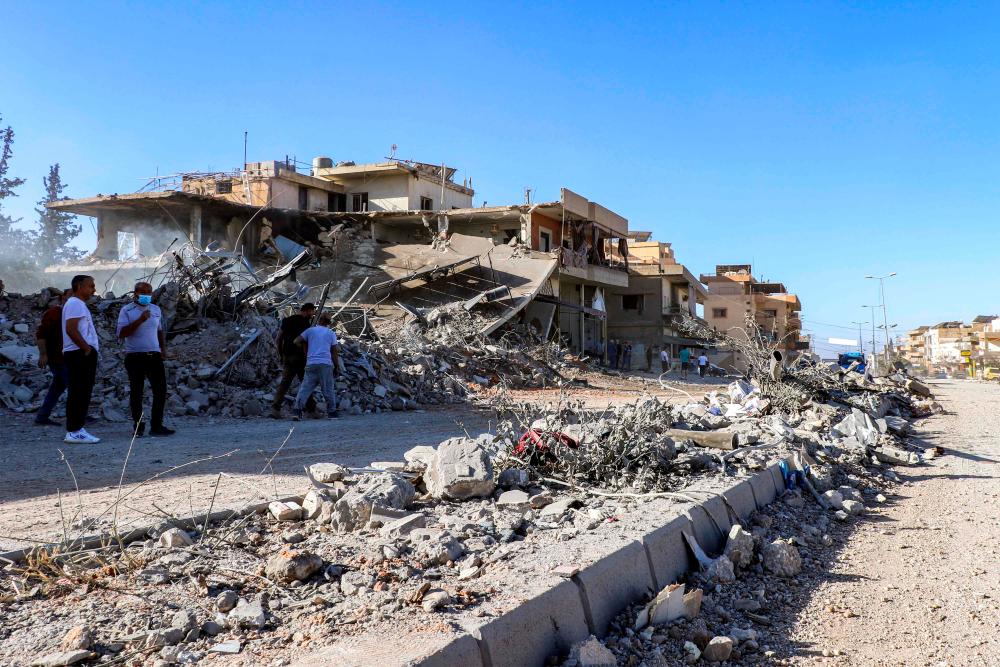BEIRUT: Lebanese militant group Hezbollah threatened Tuesday to attack targets across Israel and said it would not be defeated by ongoing intense bombardment of its strongholds and leadership.
The group's deputy leader Naim Qassem said the only solution was a ceasefire.
“I am telling the Israeli home front: the solution is a ceasefire,“ he said in a speech broadcast live.
In another day of fighting, the Iran-backed group said it launched a barrage of rockets towards the northern Israeli city of Haifa and targeted Israeli bulldozers and a tank near the border.
Israel responded with fresh air strikes around Lebanon, a day after an estimated 41 people were killed in attacks on the country, according to Lebanon's health ministry.
In a defiant speech, Qassem vowed that the group “will not be defeated” and would begin widening the scope of its targets inside Israel.
“Since the Israeli enemy targeted all of Lebanon, we have the right from a defensive position to target any place” in Israel, he said.
Only after a ceasefire would residents of northern Israel be able to return home, he said, referring to Israel's stated war aim.
Israeli Prime Minister Benjamin Netanyahu on Tuesday told French President Emmanuel Macron he opposed any “unilateral ceasefire, which does not change the security situation in Lebanon”.
Iran, which supports Hezbollah, has in recent days engaged in diplomatic talks around establishing ceasefires in Lebanon and war-battered Gaza amid growing fears of a broader regional conflict.
Lebanon's Prime Minister Najib Mikati told AFP that his country was ready to bolster its military presence in the south after any ceasefire, adding that Israeli troops were making brief cross-border incursions.
Security has been tightened in the country’s only airport in Beirut “to remove any pretexts” for an Israeli attack, Mikati added.
Israel has also been intensifying its offensive in the besieged Gaza Strip, which the United Nations warned on Tuesday was suffering under its worst aid restrictions since the war there began over a year ago.
- 'Worst restrictions' -
Despite a desperate need for more aid in Gaza, particularly in the north, UNICEF spokesman James Elder lamented that the situation was the worst since the start of Israel's offensive.
“We see now what is probably the worst restrictions we’ve seen on humanitarian aid, ever,“ he told a press conference in Geneva, adding that there were “several days in the last week (where) no commercial trucks whatsoever were allowed to come in”.
For over a week, Israeli forces have been engaged in a sweeping air and ground assault targeting northern Gaza, including the area around Jabalia, amid claims that Hamas militants were regrouping there.
“The whole area has been reduced to ashes,“ said Rana Abdel Majid, 38, from the Al-Faluja area of northern Gaza.
Majid said entire blocks had been levelled.
“The children are crying, terrified by the indiscriminate, merciless bombing. It’s like collective extermination,“ she said.
At a school-turned-shelter hit by an Israeli strike in the central Nuseirat camp, Fatima al-Azab said “there is no safety anywhere” in Gaza.
“They are all children, sleeping in the covers, all burned and cut up,“ she said.
Israel launched a military campaign in Gaza after an October 7 attack by Hamas that resulted in the deaths of 1,206 people, mostly civilians, according to an AFP tally of official Israeli figures, including hostages killed in captivity.
The Israeli campaign has killed 42,344 people, the majority civilians, according to figures from the health ministry in the Hamas-run territory which the UN considers reliable.
- Lebanon strikes -
Israel dramatically escalated its air campaign against Hezbollah in Lebanon from September 23 and then launched a ground offensive a week later intended to push the group back from its northern border.
Hezbollah has been firing thousands of projectiles into Israel over the last year in support of Hamas, displacing tens of thousands of Israelis.
Israel's military targeted several areas in southern and eastern Lebanon on Tuesday, including in the Bekaa Valley where a hospital in Baalbek city was put out of service, Lebanon's official National News Agency reported.
An Israeli strike on the northern, Christian-majority village of Aito on Monday killed 21 people, mostly women and children, according to a revised toll from the Lebanese health ministry.
The UN rights office called for a “prompt, independent and thorough investigation” of the strike which levelled a residential building reportedly being used by displaced people.
At least 1,356 people have been killed in Lebanon since Israel escalated its bombing last month, according to an AFP tally of Lebanese health ministry figures, though the real toll is likely higher.
The war in Lebanon, which has suffered years of economic crisis, has displaced at least 690,000 people, according to figures from the International Organization for Migration.
- 'National interest' -
Israel is also weighing how to respond to Iran's decision to launch about 200 missiles at the country on October 1.
Netanyahu's office said that Israel -- and not its top ally the United States -- would decide how to strike back.
“We listen to the opinions of the United States, but we will make our final decisions based on our national interest,“ it said in a statement on Tuesday.
The Iranian barrage was in retaliation for an Israeli strike in Lebanon's Beirut that killed Hezbollah leader Hassan Nasrallah and Iranian general Abbas Nilforoushan on September 27.
US President Joe Biden -- whose government is Israel's top arms supplier -- has warned Israel against striking Iran's nuclear or oil facilities.
According to a Washington Post report on Monday citing unnamed US officials, Netanyahu reassured the White House that Israel was only contemplating targeting military sites.









